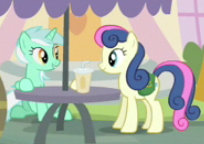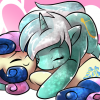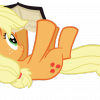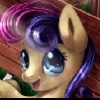
On the eve of her departure, Lyra pledges her love to Bon Bon.
Featured in the Pony Fiction Vault.

D. G. D. is a science fiction writer and archaeologist. He blogs on occasion at www.deusexmagicalgirl.com.
 Lyra & Bon-Bon534 stories ·1,664 members
Lyra & Bon-Bon534 stories ·1,664 members
 Lyra463 stories ·841 members
Lyra463 stories ·841 members
 Completed Story Compendium21,078 stories ·1,703 members
Completed Story Compendium21,078 stories ·1,703 members
 Meri's Favorite Stories1,559 stories ·70 members
Meri's Favorite Stories1,559 stories ·70 members
 Bon Bon Fan Club224 stories ·234 members
Bon Bon Fan Club224 stories ·234 members
On the eve of her departure, Lyra pledges her love to Bon Bon.
Featured in the Pony Fiction Vault.
Page generated in 0.108 seconds
Total duration
986 users online
1,951,466 hits today, 2,707,512 yesterday
My Little Pony: Friendship is Magic Fanfiction
Designed and coded by knighty & Xaquseg - © 2011-2024
![]() Support us
Support us
SubStar
Chat!
Discord
Follow us
Twitter
MLP: Friendship is Magic® - © 2024 Hasbro Inc.®
Fimfiction is in no way affiliated with or endorsed by Hasbro Inc.®

Lots of funny lines, some very sweet and poignant moments between Lyra and Bon Bon.
i1.kym-cdn.com/photos/images/newsfeed/000/138/246/tumblr_lltzgnHi5F1qzib3wo1_400.jpg
My gosh! So many figurative punches in my gut. First I saw a Lyra story and I was going to read it, then I saw your name next to it and I started reading. Finally, when I was reading and hit the moment when I realized that it is in the same universe as Chronomistress? Figurative K.O.
I enjoyed this story. The characters all had distinct personalities, the dialogue was sharp, and the resolution was generally satisfying. The whole situation felt very real and three-dimensional, and I appreciated all the implied backstory and history these characters have. I found that much more interesting than the philosophy or the cultural worldbuilding, but I suppose that's just a matter of taste.
And thank you, thank you, thank you for not making Lyra human-obsessed. I've grown so weary of that stale old cliché. This fic was like a breath of fresh air.
2312815
This is a prequel to an HiE I may complete at some future date, though this story contains no reference to humans as it would be out of place. In the HiE, Lyra will be interested in humans, but more subtly than is sometimes depicted.
Fun story. I don't quite get the Lyra/Bon-Bon obsession, but it's a good story. The dialog is well-done, there's just the right amount of foreshadowing at various points, and there's a nice happy ending. Can't ask for anything more.
I liked it, the dialogue was funny.
I do find it odd though that there isn't Homosexual Marriage in Equestria.
Granted we've only seen Hetrosexual Marriage so far in canon (To be frank, we've only seen one married couple at all. Everything else has just been assumed) it isn't unrealistic to think that with such a high female to male ratio, there would likely be a fair amount to lesbian relationships happening.
I'm not saying that this must be included and I'm getting really sick of stories where EVERYONE is Lesbian for no more purpose then they could, but I find it personally really odd when this doesn't seem to addressed.
Also with children, if there is a 10-1 XX-XY ratio happening, then casual relationships ending in children would likely be common as we have just never seen any massive families. Yet Bon Bon treats this with scorn. Would Illegitimate even be an issue?
In Demon Grooming Pony Slayer, there is the 'Herds' solution for the child issue and, assuming this shares similar origins as Pony Grooming Slayer Demon, then the notion of illegitimacy likely wouldn't exist.
And hasn't Lyra already been to Canterlot? She waves at Twi in the pilot.
What's wrong with being an Earth Pony?
Word of God said that Alicorns are a combination of all Three races (Hence the size) and although we have only seen a Unicorn metamorphosize, there's been nothing specifically to state it's a Uni- only deal.
2328081
Some good questions.
According to available sources, which are spotty, the ponies of the Valley of Dreams lived in Paradise, where they neither married nor were given in marriage. The introduction of the rites of monogamous marriage are attributed to Magog the Mighty, who according to legend judged the ponies for two years during the "Silver Age" (known to scholars as the Paleo-Pony Period) following the end of the reign of Majesty (the "Golden Age"). The Ordinances, carved on stone tablets supposedly carried by Princess Platinum to Equestria during the Exodus, stand in Canterlot's Hall of Justice; the laws written on the tablets, which include an injunction to monogamy, are attributed to Magog herself. The early date of the tablets is defended by scholars of the conservative School for Gifted Unicorns, but disputed by the academics of the Academy for the Sacred Order of Timekeepers. Timekeepers are sometimes called "minimalists" because they generally consider unhistorical anything not mentioned in their own continuous record, commonly referred to as the Long Count.
The notion that an earth pony cannot become an alicorn comes from Carrot Top's mother and is not necessarily correct.
I really enjoyed this. I was impressed by the skill with which you captured friendship between girls. It was touching and realistic, and you gave a lot of character to ponies who only appear in the background in the show.
2335499
Thank you. Not being a girl myself, I'm gratified to hear I can depict them halfway believably. Of course, I did spend five years drafting a magical girl novel, and I think it got me in touch with my feminine side.
Review: Forever by D. G. D. Davidson
One hard thing about critiquing your stories is that you include so many elements that carefully tread the line of plausible deniability that it's tough for anyone to say much about them with confidence. Then, too, there's the fact that you generally write very well, which obscures what flaws there are in your works through a sort of hypnotism. And when even your stories' flaws are interwoven seamlessly into their narratives, it's hard to suggest many changes without threatening to unravel the entire garment.
Nevertheless, I will attempt to give you an honest and thorough analysis of Forever, leaving it up to you to decide whether and how to use my advice.
Let's begin at the beginning: the title. I don't think Forever is a very good title. Sure, it bears some relation to the subject of your story, and it could possibly even be construed as 'subtle' or 'thoughtful'. But I'd ask you to put aside intellectualism for a second and just think of the connotations that word possesses, both in itself and as a ponyfic title. "Forever" connotes eternity, unchanging stillness and sameness, existence in a single state without end—in other words, BOOOOR-IIIING. And you've got to understand what I mean when I say this, because I'm not asserting that eternity is actually boring, but only that it will seem so to the average reader, who isn't going to read the word "Forever" and remember that God is pure act and look forward to eternity in heaven as something more thrilling and unpredictable than anything humanly conceivable. As a ponyfic title, the word connotes the most generic sad-sack fics about Celestia or Twilight outliving their friends due to their own immortality. Or else, sentimental romance stories. So surely you'll understand me when I say that there's just nothing about the title that grabs me at all, nothing that draws me in. It doesn't differentiate itself, doesn't promise anything concrete or tangible. And it's an especially surprising title coming from you, because your story titles are normally exemplary: "A Mighty Demon Slayer Grooms Some Ponies", "Assassinate Princess Celestia!", and "Brony Steve Makes Out with Fluttershy" are all very fine titles, as I'm sure you don't need to be told.
Moving on, we come to the synopsis. I have to admit that if I weren't as familiar with your writing as I am, I would have thought from reading the synopsis that you'd forgotten to use a [Shipping] tag. No doubt you were going for this effect, but I have some further complaints about the synopsis: it doesn't (seem to) tell me anything. What it seems to tell me (though it is lying) is not so much like what will happen in the story—it instead just seems like another tag, a [Lyra x Bon] tag, serving only to locate the story in what is something like a ponyfic genre. The reason this is a problem is that, in seeming to say little to nothing about the plot of the story, the synopsis gives me no confidence that I know what the story will be about and hence no confidence that I want to read it. Note that the fact that the synopsis actually does say something (however minimal) about the plot of the story doesn't matter, in this respect: it's enough for the synopsis to seem to the reader to say nothing for it to fail to achieve its purpose.
I'm harping on this because I think you may have really missed an opportunity here, and I'd suggest that you could be underestimating your audience. Good friendshipping is comparatively rare in this fandom, and I think that a synopsis which clearly promised a unique take on friendshipping—which is what you have here—would actually have more appeal than a generic promise of a done-to-death fanon ship. Though I could be wrong, of course. But, to be absolutely clear, the reason I think your synopsis needs work is that when I read it, I did not feel reassured about my choice to read the story; I didn't feel intrigued and spurred on; I couldn't even say confidently that I knew what the story would be about. Those are the problems that need addressing.
So, after reading the synopsis, we're finally ready to open up the story and plunge balls-deep right into this mofo, sitting on the edge of our seats, faces dripping with anxiety over how it will begin, and what we find is... the epigraph.
Ha.
How can I say anything bad about Aristotle without seeming like a Neanderthal? Ah well, better get this over with. The first and most important thing is that after reading this mystifying quote, I still don't feel like I know what the story's about. So that's a total of three opportunities to tell me what the story's about—title, synopsis, and epigraph—that you've passed up. I don't have to tell you that the number three symbolises completion. Another problem with this quote, lesser but still significant, is that the literal content of it seems unintuitive and even demonstrably false to the modern mind. Does Aristotle really think that people who don't live together cannot, by definition, be friends? The sort of mental gymnastics I would have to engage in to understand how that makes any sense would be at least so distracting to me that I would have to entirely remove myself from the mindset of wanting to read an entertaining pony story. The only alternative I have is to brush it off as a silly archaism; but in that case, you're in the position of having placed a silly archaism in the most prominent place in your story. So now I've got reason to look askance at you, the author, even though what I'd most like to do is forget that you exist and just get lost in your story.
So, having aired my complaints, here is how I would rephrase the quote if I were in charge of things:
I think this is superior because it's shorter, easier to remember, keeps the substance of the quote, and cuts out the irrelevant (to the story, that is) asides, the distracting reference to "men", and the silly-sounding stuff about "well-wishers". Also, the way it's structured, it sounds a bit like "No two ponies can truly consider themselves friends until they have shared a bed!" But, yeah, just my opinion, grain of salt, blah blah blah. Maybe I'm butchering a wonderful artistic statement with my ham-handed populist hack suggestions and I ought to be defenestrated.
But all right, holy shit, I'm finally gonna talk about the story now.
Okay, so, the bulk of the story is tucked into one main scene in the middle which has five mares in a small room, and I'm going to focus mainly on it, because I think that scene is where most of this story's problems lie. To be fair, it's an ambitious scene that would have been difficult to execute well under any circumstances, and I think you did a more than reasonable job with it, especially considering its complexity. I think that I can, however, detect some issues which may be serious enough for you to consider addressing.
The characters are the centerpiece of the story, so that's where I'll start. Here is my first brash assertion: On a first reading, the characters are not as distinct as they should be. Now I have realized, after a second look, that you did take quite a bit of effort to distinguish the characters: Carrot Top says "that's not quite decent", Minuette speaks intellectually, Bon Bon is a giant bitch. However, I didn't get that on my first reading, which seems to me significant. "That's not quite decent" just seemed like a phrase everyone in the room was saying for some reason. "Psuedepigraphical" (and the rest of Minuette's intellectualism) felt out of place, like you just wanted to shoehorn in more Christianity parallels. Only Berry Punch was clearly distinguished in an unforgettable way. I will also say that I was eventually able to remember that Carrot Top was making the tea and that Minuette was officiating at the ceremony (though only with some difficulty, given the constant shifting between the narrator's "Minuette" and the characters' "Colgate".) But, and not to make a bigger deal of it than it is, but getting hit with six names of background characters all at once just drums up a blurry haze of similar connotations for me. (I think all five of those characters show up in the "Winter Wrap Up" song sequence, for example.) They just haven't been very distinct in my mind prior to picking up this story, so I feel like I could have really used more hand-holding from the author about who's who in this story, especially if I were only going to read it once, like the average reader.
I also think—and this gets into the conflict, too, but that's a separate issue—that characters like Bon Bon, Minuette, and Carrot Top are not actually all that distinct once you dig past the surface. Each of them, for example, takes potshots at the others with little or no provocation. Each of them has a lot of prideful confidence in the correctness of her own opinions. Throughout the ceremony, Carrot Top and Minuette take turns scolding the rest of the mares in the room, and Bon Bon scolds everyone at the end. Could you believe me, then, if I said that those three may be essentially the same mare underneath all the trappings and "accidental" qualities?
Lyra, for her part, is likeable enough, but her likeability comes across as very understated and easy to miss or forget about. Again, it was only on a second reading that I realized she was the one mare who was constantly giggling, booping noses, taking things in stride, and generally having a good heart. (One strange thing related to this is that one of the very first things you show Lyra doing is getting irritated. I think that's pretty unfortunate and confusing, considering her characterization throughout the rest of the story.)
So... Berry Punch. Hmm. I will use Berry Punch, I think, to segue into a discussion of how you handled the conflict in the story because, let's face it, Berry Punch isn't so much a character as a plot device. I complained about your lack of sympathy for the clopper dude in Brony Steve that led you to write him as an extremely flat character, and I think you've done a similar thing here with Berry Punch (and even somewhat, if I may say so, in Chronomistress with Derpy).
From what I can extrapolate, you put Berry in the scene as a sort of comic relief character. The idea, of course, comes from the requirements of proper pacing in story writing: you have to have "down" moments in order to make the "up" moments stand out by contrast, and you have to place each type of moment carefully so that you don't tire your reader out with too much stress or bore them with too little conflict. That makes sense, right? Well, then, here's the thing about Berry: her "comic relief" parts, which seem to have been intended to provide the necessary "down" moments which are the reader's temporary respite from the story's conflict, in fact only serve as sources of even more conflict. The result is that the main scene feels unbalanced: it's all conflict, all the time, without a break.
Berry is reproachably selfish, single-minded, and crass. I wouldn't even want to meet someone like that in real life—yet she's supposed to be a good friend of these other mares? The aversion that I feel to Berry as a person, and the paradox of her friendship with the story's other characters, are themselves conflicts that only irritate and stress me as a reader. A character like that doesn't make a good choice for comic relief, because I just get no relief at all from seeing her. Every time she opens her mouth, I think: "What fresh hell is this?"
Further, her bullshit actually seems to contribute, storywise, to the degradation of the room's mood. So in addition to being a conflict unto herself, she's also literally helping drive the story's conflict.
All this by way of emphasizing not just that Berry's "comic relief" is ineffectual, but more importantly, that the scene itself contains no periods of relief. In fact, as it drags on, everything becomes a source of conflict: the tea (which is too hot and has too much clove, pepper, and vanilla), the bowl which clatters and spills, the sarsparilla which is warm, Minuette's mentioning that she finds the ritual "touching", Carrot Top's weird touchiness about, well, everything (especially Derpy... I mean, really?). There's basically nothing that you haven't turned into a source of conflict. And gee, it just makes me want to cry.
Except that it doesn't. And that's because you have another problem: you didn't bother to make me like the main characters before dumping all this conflict on me. You know that a reader has to have sympathy for (I will not say "relate to", but "have sympathy for") a character for that character's conflicts to resonate with the reader—in other words, to matter. The closest you come to doing that with either Lyra or Bon Bon is with Bon Bon's line which closes the opening scene: "I don’t need to be a famous candy-maker, and I doubt I have it in me to be one anyway." These words evoke sympathy only by way of being characteristic of someone depressed. In other words, you're venturing dangerously close to "Nobody loves me, everybody hates me, I'm-a gonna eat some worms" territory. Nopony else does anything that might really endear them to the reader, least of all Lyra, who, as I've said, is surprisingly quiet, even to the point of being overwhelmed by the force of the other mares' personalities. And so I think this gets to the heart of why it's hard for me to really get into this story or feel anything for the characters. It's as if I'd been flipping channels on television and came to some drama on TNT or something, with expertly written realistic dialogue, good-looking actors, and grimy, immersive settings: I simply wouldn't be able to get into it without first being able to sympathize with the characters.
Hopefully I've made my point by now, so I'll move on. Regarding the basic premises, I think lavender's questions (above in the comments, to which you responded) are actually very good ones, and I will further suggest that the fact that he or she had those questions at all after reading Forever points to some deficiency in the story—in other words, the fact that you were able to answer his questions by referencing your own personal lore bank for the universe you're working in does nothing to solve the problem that the story itself tends to leave these questions in its readers' minds. Stories should be written with enough information so that readers won't have any doubt that the premises are at least reasonable possibilities on the story universe's own terms. Otherwise the whole edifice of storytelling, being built on sand, collapses.
For my own part, I question whether a reasonable mare (as Bon Bon seems to be) would really come to look down upon her own species' birth ratio (and the attendant consequences for monogamous marriage) as some sort of curse after living only two years among heathen, carnivorous griffons. Indeed, she seems to be infected with something much more like our human, Western misconceptions of marriage as some near-magical, ultimate source of romantic bliss and fulfillment. Where did she get these ideas, and why did she so easily adopt them? Also, given pony biology, she's presumably... well, wrong in what she asserts about friendship and marriage. Am I, as a reader, supposed to sympathise with her in her error?
Things get pretty confusing at the end, so that I think there's supposed to an apotheosis of some sort when Bon Bon forces Lyra to promise to "be happy", but it's difficult to be sure of this given that I can't agree with either of her assessments (her statement that the value of friendship between mares is just "compensation" or her implication that marriage is the source of true "happiness"). Or perhaps the true conversion comes about when Bon Bon lays down in bed beside Lyra at the very end? Has she accepted the value of friendship between mares after all, or is this a lone, arbitrary gesture done out of resignation and destined to futility? It's hard to say. Either way, it's certainly not the sort of rousing, cathartic ending that ponyfic authors generally aim for, so while I won't criticize it for trying to do something subtle, I will suggest that it's unnecessary obscure, and I'll also go ahead and point out the obvious: it's not going to win over many average readers.
(As for the ending, I'd also suggest that you make it more explicitly clear that Bon Bon is lying down in bed beside Lyra. I'm embarrassed to say this, because it's probably more my fault than yours, but I completely missed the implication on my first reading and assumed Bon Bon was going to bed in her own bedroom.)
Aaaaaaaand... welp, looks like that's about all I have to say.
Happy revising, hope this helps!
Assorted miscellanea:
-I'm unclear on whether Minuette is holding the ceremony for Lyra and Bon Bon of her (Minuette's) own volition, or whether one or both of them requested it from her.
-Why does Bon Bon call griffon mead "poison"? It comes across as being anti-alcoholic rhetoric rather than something pertaining to pony biology, and as a result is confusing when seen in the light of the sarsparilla.
-The whole exchange between Carrot Top and Bon Bon mirrored Christian bible scholarship a bit too closely for me to not be set on edge—I felt a vague personal obligation to take Carrot Top's side in the dispute, which was irritating given her anti-intellectual tone. Especially the use of the word "Exodus" was jarring in the back-and-forth.
-I think the opening sentence of the story could be improved. There are two or three other sentences I noticed that I thought could stand improvement, but the opening sentence is probably the most important. The construction "using a combination of touch and magic" is the main offender here as far as I'm concerned, because it says (ungracefully) something that's already largely implied by the text.
2351408
That's probably one of the most incisive analyses I've ever received for anything I've written. Thank you for taking the time to produce that.
I agree with you entirely on the title, synopsis, and opening quotation. Quotations aside, I do think titles and synopses are things I'm generally weak on. Of the titles of mine you cite, Assassinate Princess Celestia! is the only one I personally like, and as for synopses, I am always sore tempted to dissemble with the reader when I write them, not really lying but giving him the wrong idea, as I did here. And as I did with Brony Steve. And Demon Slayer. That last is the only story where it's paid off, so you'd think I'd have learned by now.
Regarding most of the rest, I think I can repair some technical issues you and the EqD pre-reader have pointed out, but beyond that, I may have to simply note all the reasons the story is defective, admit it's defective, and move on. It's a small vignette within a larger universe, the "Chronoverse," let's say, and the reader has no reason to know anything about all my headcanon I've dumped into this vignette, and so has a right to be confused. This is a spinoff from a larger work that's not even published.
Your analysis of the characters is something I think I must take to heart. In some cases, squeezing conflict out of every last damn thing works for me, but I think here it did not, for the reason you cite. Your conclusion that the characters are the same character with altered surface characteristics is insightful: that's exactly what they are, by which I mean, they are all skin-deep. This tells me they aren't finished products.
Regarding the biblical allusions: I admit those amuse me, but I can understand how they are distracting. They're the same ones from Demon Slayer, but there, at least, they're embedded within a much larger work. I might need to reconsider those before I use them again.
2351408
In Aristotle's defense, the ancient Greeks didn't have social media...
I guess what he said can be made more palatable for us moderns if we rework his quote. Perhaps he might mean that you tend to become friends with those you usually spend time getting to know. That is, for the friendship relationship to even develop, you two need to get into contact, which in the flesh usually means people who live in your neighborhood, go to your school, or work the same job, etc.
To use FiM as an example, Twilight Sparkle didn't become friends with the Mane Six until she moved into Ponyville and started hanging out with the group. Like us, the viewers, Twilight started recognizing and appreciating the admirable qualities that each pony possessed. She didn't want to leave Ponyville but wanted to remain with her new friends. But to make this kind of discovery, you first need to be physically close to another pony.
Of course, the advent of social media changes the dynamic of friendship a bit, as many of the characteristics Aristotle identified (usefulness, pleasantness, virtue, goodwill) are still present, except for the physical proximity. I'd say right now that reconciling Aristotle's definition of friendship with "Facebook" friendship is one of my top priorities in my philosophical studies. (I've met many folks on FB and other sites whom I imagine I might have been good friends with, had we lived closer, though, of course, perhaps we are still friends of a sort. As a personal aside, I remember first running into DGD at his blog when he posted about DerpyGate.)
***
Also, it's great to see that you seem know something about ancient and medieval philosophy by mentioning the idea of God as Pure Act. I didn't expect to run into many Bronies speaking of the ipsum esse subsistens, that's for sure!
2351408, 2358635
The translation of Aristotle I'm using has an end-note explaining that Aristotle by "living together" does not mean under the same roof. As Mr. Ryan points out, the ancient Greeks didn't have social media and probably not a reliable mail system, either. I suppose those who could really be your friends, your truly close friends, would necessarily be limited to those you "live with," in the sense of having good access to. For purposes of this story, I chose to deliberately misinterpret Aristotle's words; the main point is that Bon Bon and Lyra, who literally live together, are facing a future where they are not even in the same town. I think shortening the quote as you suggest is a good idea.
And let's not forget, Eric, that we've spoken of possibly meeting IRL, so I think we must conclude that Aristotle is correct that something in friendship is missing without physical proximity.
I quite enjoyed this. I had no problems distinguishing the characters from one another, and found the whole main scene touching because of the constant conflict Kierkegaard mentions. Because they're all sniping at one another, because they all clearly disagree on so many topics, because they just don't seem to get along - but they're all here. They're all friends, and that friendship has transcended their smaller interpersonal problems. Despite all their differences and issues, they're all still there for one another.
Fascinating worldbuilding, too.
2454697
I'm glad to know that you think so. I think I can understand both points of view, and I'm gratified to know that this gaggle of friends appeals to some readers, since I intend to recycle them in my future works. I really enjoy writing them, constant sniping and all.
On the technical side, I think the biggest problem is Minuette's nickname. It worked in Chronomistress because characters were only calling her Colgate for one brief scene, but it doesn't work here. Even though I like her nickname as little as she does, I'm going to have to bite the bullet and call her Colgate in the narration in any future stories in which she's not the main protagonist.
2455782
I will admit that was the one little thing I didn't care for - there's no explanation as to why the characters are insisting on calling her Colgate when her real name is Minuette.
2455795
Yes, that's explained in Chronomistress, wherein Minuette's friends tease her for her obsession with oral health and she, under the pressure of working with the intolerable Dr. Time Turner, considers abandoning her cutie-mark-determined destiny in favor of a career in dentistry. Here, there's no explanation. I will add this to my list of lessons learned from this story: setting it in the same universe as another story doesn't give me the right to expect that a reader understands and appreciates all the details.
2455809
Really, in the end it gets filed away as something that happens offscreen that's largely unimportant to the story. Some sort of throwaway line, even half a line, hinting towards why it's a point of contention would be interesting but if there's no smooth way to integrate it, it's not a dealbreaker.
2351408 2454697 The story struck me as within spitting distance of being great.
The story struck me as within spitting distance of being great.
I agree with much of what both of you said, though you disagreed with each other...
I found the characters distinguishable, and I see how the constant squabbling of friends can be endearing. (That's one of the foundations of the show, after all; the mane 6 were designed to be maximally unlike each other. You can think of them as 3 characters, all very different, and for each a pony in some way their opposite: Twilight/Pinkie, Rainbow/Fluttershy, Rarity/Applejack.) But the squabbling went on too long for me, without comic relief as K. notes, and I skipped about half of that one big scene.
I think Berry Punch detracts a lot from the story. "Hic, I'm an alcoholic" was funny once upon a time, in the very first fanfic where she was used that way, and hasn't been funny since. Every line of hers irritated me, not because she's an irritating person, but because they were predictable and on-stereotype, and between her lines and ponies' reactions to them, took up a lot of space while giving nothing.
What's really interesting to me is the link between Bon-Bon's feelings about the male/female ratio and her relationship, whatever it is, with Lyra. My sense is:
- They're not lesbian lovers here, they're just friends.
- BB doesn't want to be lesbian; she wants a stallion and possibly a family. She's bitter and jealous whenever any other mare connects in any way with a stallion.
- BB could become Lyra's lover out of desperation. She wants a stallion, but thinks this relationship with Lyra is the best she can ever do, and now even that's being taken away.
- This strange intense, ambivalent, want-but-don't want vibe of Bon-Bon's could be what's driving Lyra away.
There's something very poignant here, about how mares cope with their hopeless odds in a society that has a 10:1 sex ratio and yet only monogamy. The idea that "Friendship is Magic" is a lie made up by desperate single mares to comfort themselves for their failure, and its consequences played out in a strange friendship-with-socially-imposed-sexual-tension that isn't what either partner really wants. That Lyra's departure isn't about the harp at all, or that Bon-Bon is bitter because she realizes the best relationship she can hope for is only the kind that can be broken up by a harp. If that's what you were aiming for, and you rewrote this some to focus on that, you could hit one out of the park.
I could imagine their friends' jibes near the end are peer pressure, because all reluctantly-lesbian mares (which these friends aren't, but I'm re-imagining the story now) wants other mares to be the same, so they feel less like losers themselves.
The first problem is to explain why they would even consider monogamy (horses, after all, are not at all monogamous). The second is to make it a little more clear, as K mentions, how Bon-Bon understood what she saw among the griffins, and why she wants it so much. The third problem, and the biggest, is to think hard about how this affects all the characters (say, Derpy chooses out-of-wedlock parenthood because it's her only choice; Carrot Top keeps having brief flings with stallions, always deceiving herself into thinking it will develop into something more; Colgate has renounced the whole business). Then have them talk around that, instead of making a string of thematically-unrelated jibes at each other.
2477671
I don't think I've ever gotten closer to great than spitting distance, so perhaps I should be content with that.
You ask a lot of keen questions. I'll make sure to have clear answers to them before I sit down and write another story in this same sub-universe.
Interesting example of worldbuilding... I wonder, what events could have possibly caused such an immense disconnect between biological and social norms? If 1:10 male/female ratio was inherent to pony species, it seems logical that either polygamy would have been widespread, or more mares would have been inclined to have same-sex relationships naturally (not out of despair to find a stallion).
Gender imbalance is usually typical for species that are going through repopulation after some kind of catastrophic event. Since griffons don't have this kind of disparity, it could be speculated that ponies also had equal gender ratio in past, before this theoretical cataclysm, which is still reflected in their culture. I'd say, these are the consequences of the Age of Chaos, but given the quotes from Clover, this idea doesn't hold at all... This leads to the conclusion that pony society is incredibly static, or perhaps kept in stasis by some kind of force. Otherwise, I find it hard to believe, ponies haven't accepted polygamy in a couple of centuries. I just hope that explanation is not "ponies have magical physiology and social psychology" - it would be doing a great injustice to all details that have been put into this setting.
Friendship as a consolatory ideal for lonely mares fits the story very well. It would be interesting to hear male point of view on the subject.
2489689
This is something I intend to develop more thoroughly in future stories. It isn't magical physiology or social psychology, but almost the opposite. The idea I'm running with is that the ponies, magic and intellects and all, are still basically horses. A ten-to-one female-to-male ratio is normal for horses in the wild and also appears to more-or-less match what we see in the show's wide shots. They are, you might say, biologically polygamous, but for historical and other reasons, generally practice monogamy, which is reinforced by law. The conflict between their animal and rational natures is much sharper than it is in humans.
Congratulations on the Pony Fiction Vault!
I don't have much to add on top of the excellent critiques by K, BH, et.al., but I did want to say this is a fascinating contrast to my own (upcoming Vault inductee) Fugue State. It was curious to see such remarkably divergent takes on a Lyra/Bon Bon story that nevertheless touched on some similar themes. (In particular, your penultimate scene feels like one of the moments in Fugue's second chapter as seen through a looking-glass.)
Similar to 2477671, I think Berry could stand a touch of editing; not because she's so boorish (though she is), but because it feels like she's the only character who doesn't have depths. The others' bickering all feels like it traces back to something in their personality or experiences, and the tension we see is emblematic of much deeper things going on inside their heads (nice job with that, by the way; I thought the reveals had just the right touch of subtlety), but with Berry, she's just … drinking. Nopony ever calls her on it. We don't find out what she's running from. She just feels like that one friend that shows up at your parties because nobody has the guts to disinvite her. We could really use a touch of understanding so that the audience has some idea of why the others put up with her as they do.
I think your final scene is both sweet and necessary: after the unrelenting tension of the scene-long running argument, and the dissolution as the ritual fell apart, it felt cathartic to see Bon Bon taking things seriously on her own terms. In a way, I feel like that showed she was taking things the most seriously: there's certainly significance to a public declaration of unity, but love is really about what you do, not what you tell people, and the others were getting so caught up in the trappings that I think they were losing sight of that.
Good little read.
Best,
H
I guess there isn't anything to add beyond what's been discussed here already. The first two-thirds was absolutely brilliant to read: FimFiction just doesn't have enough authors who can write really good, flowing dialogue (even if my inner editor does want to go in and straighten up some of the attribution). Then I got onto the meat of the story and it just fell apart; the details don't fit together in any way that I can find meaningful. I can't help but feel that a genuine diamond of writing suddenly threw itself away on fan-based wankery.
Even so, it has been a good while since the act of reading has been so much fun in and of itself.
-Scott
EDIT: To touch of some comments made below, I thought the very things Kierkegaard touched on were the reasons I liked the character interactions. Watching a group of friends bite into each other without breaking the flow of conversation—or rather, integrating the breaks into the whole—reflects close bonds and an ease of interaction that even the main 6 frequently lack. A sufficiently tight-knit group will share hordes on in jokes, experiences, and phrases that make them a clique, which is exactly what I felt here. These characters weren't skin-deep, they're just forged by intimacy.
2455820>>2455809 It isn't necessary that you explain. A reader only needs to know that there is an explanation, and have an apparent discrepancy acknowledged so that they can be comfortable with it.
That went a bit of a direction I didn't expect regarding the PFF ceremony and pony society's stance on Friendship. Makes me wonder about Twilight's BBBFF idea, or if that is something she just made up as a filly patterned after the PFF bond.
It's also interesting to think of this PFF ceremony as something that the mane six have either partially or fully exchanged amongst one another. AJ's comment "As one of your PFFs..." makes it sound like she knows Twilight has more than one including herself, but her subsequent need to explain the acronym makes me think that it's not something that all six of them are familiar with. Then again, that was pre-wedding, with Twilight a princess in this the rest of them may have eventually made the same bond.
I . . . didn't like this. I didn't dislike it, but nothing about it really stuck with me.